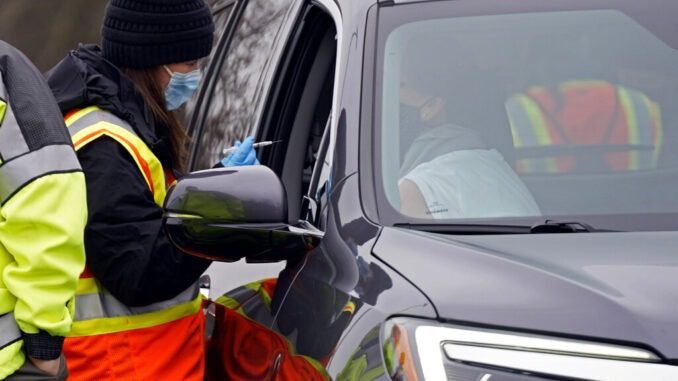
RALEIGH — When Ottis Grimes tried to call a hotline after the state opened up vaccines for seniors last month, he was met with an endless supply of music as he remained on hold.
Frustrated with the appointment booking process, the retired banker who lives in Lake Wylie, South Carolina, but still goes to the doctor in North Carolina, took advantage of an offer to get the vaccine across the state border.
After receiving a message from Atrium Health in Charlotte notifying him that he was eligible for the vaccine, he immediately had his computer-savvy daughter register him online.
Getting his first shot in mid-January was a simple and short process, Grimes said. He went to a drive-through site that had only a handful of cars in front of him, got vaccinated, waited in his car 15 minutes to ensure he had no side effects and then drove off.
“It’s very taxing for seniors to be shifted, kind of like a herd of cows,” Grimes said.
Grimes is among the more than 27,000 out-of-state residents who have crossed into North Carolina to get vaccinated, state health officials told The Associated Press on Wednesday. A number of other states allow people to cross borders to get shots.
Of the more than 1 million people vaccinated thus far, the county of residence is labeled missing for nearly 3% of first dose recipients.
Late Thursday, the department announced the first case of the South Africa variant of the virus had been identified in a North Carolina resident who had not recently traveled.
Dr. Mandy Cohen, secretary of the department, said in a Tuesday news conference that “jurisdiction is not meant to keep anyone from getting the vaccine,” but that the state would review guidance from the Centers for Disease Control and Prevention released earlier that day. She also said she would look into the missing geographic data.
In a statement to the AP the following evening, her office said, “The ‘Missing County of Residence’ number is the number of people vaccinated that either did not indicate a county of residence or indicated a county of residence that falls outside of North Carolina. Out of the first doses administered in North Carolina, 2.72% have been to non-residents of the state.”
The 2.72% figure represents more than 27,000 people, or 1 in 37 people vaccinated in North Carolina since distribution began in December.
Cohen noted that while local health departments are not allowed to deny service to people based on where they live, they could give preference to state and local residents.
“There are ways that you can both market and open appointments and use your operational capability to make sure you are prioritizing those in your county or in the state of North Carolina,” Cohen said.
DHHS said its data shows that 14%, or about 1 in 6 first doses, have been administered to North Carolinians whose county of residence differed from the county that they were vaccinated in. This could include health care workers who were vaccinated at their job site and residents 65 years or older who attended a large-scale vaccination event.



